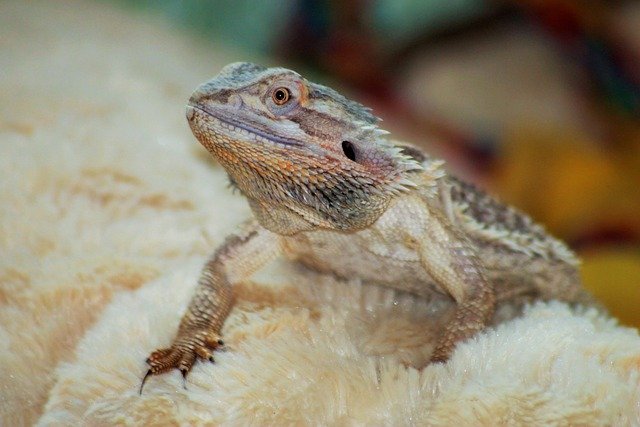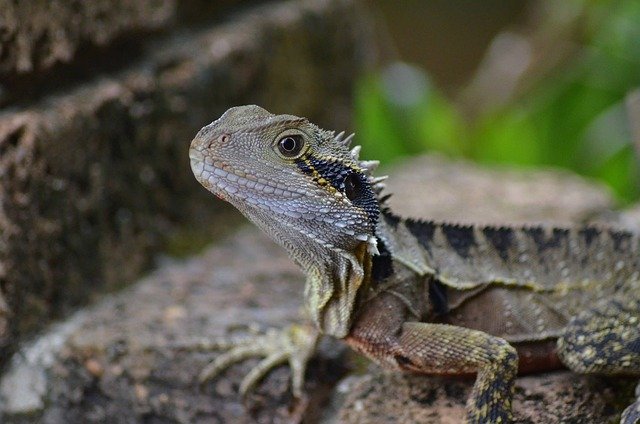Bearded dragons are known for their unique diet that includes a variety of insects, fruits, and vegetables. However, many owners wonder if they can feed their bearded dragons nightcrawlers, which are a type of worm commonly used as fishing bait. In this article, we will answer the question, “Can bearded dragons eat nightcrawlers?”
First, it is important to note that bearded dragons are omnivores, meaning they eat both plants and animals. While insects are a staple in their diet, they can also consume worms, including nightcrawlers. However, it is crucial to ensure that the nightcrawlers are safe and healthy for your bearded dragon to eat.
When considering feeding your bearded dragon nightcrawlers, it is important to take into account their nutritional value and any potential risks. In the following sections, we will explore the benefits and drawbacks of feeding your bearded dragon nightcrawlers, and provide tips on how to safely incorporate them into their diet.

Understanding Bearded Dragons’ Diet
Bearded dragons are omnivorous, meaning they eat both plant and animal matter. Their diet should consist of a variety of insects, vegetables, and fruits. Understanding the proper diet for your bearded dragon is essential for their health and well-being.
Insects are a crucial part of a bearded dragon’s diet. Crickets, mealworms, and dubia roaches are all excellent sources of protein. Be sure to feed your bearded dragon insects that are appropriate for their size. For example, small bearded dragons should be fed smaller insects, while larger bearded dragons can handle larger insects.
Vegetables and fruits are also an essential part of a bearded dragon’s diet. Dark, leafy greens like collard greens and kale are excellent sources of calcium and other nutrients. Fruits like strawberries and blueberries can also be given as treats in moderation.
It’s important to note that not all insects and vegetables are safe for bearded dragons to eat. For example, avocado and rhubarb are toxic to bearded dragons and should be avoided. Additionally, insects that have been caught in the wild may carry parasites or pesticides, so it’s best to purchase insects from a reputable source.
In summary, a healthy diet for a bearded dragon consists of a variety of insects, vegetables, and fruits. By providing a balanced diet, you can ensure your bearded dragon stays healthy and happy.
Can Bearded Dragons Eat Nightcrawlers
Nightcrawlers are a type of earthworm that are commonly used as fishing bait. As a bearded dragon owner, you may be wondering whether or not it is safe to feed your pet nightcrawlers. In this section, we will explore the nutritional value of nightcrawlers and potential risks associated with feeding them to your bearded dragon.
Nightcrawler Nutritional Value
Nightcrawlers are a good source of protein, which is an essential nutrient for bearded dragons. They also contain a variety of vitamins and minerals, including calcium, which is important for bone health. However, it is important to note that nightcrawlers are not a complete diet for bearded dragons and should only be fed as an occasional treat.
Potential Risks
While nightcrawlers can be a nutritious snack for bearded dragons, there are some potential risks to consider. One concern is the risk of parasites. Nightcrawlers can harbor parasites, which can be harmful to your bearded dragon. To minimize this risk, it is recommended that you purchase nightcrawlers from a reputable source and only feed them to your bearded dragon occasionally.
Another potential risk is the size of the nightcrawler. Bearded dragons can choke on large pieces of food, so it is important to ensure that the nightcrawler is an appropriate size for your pet. You may need to cut the nightcrawler into smaller pieces before feeding it to your bearded dragon.
In conclusion, while nightcrawlers can be a nutritious treat for bearded dragons, it is important to consider the potential risks associated with feeding them. If you choose to feed your bearded dragon nightcrawlers, make sure to purchase them from a reputable source and only feed them occasionally.

Alternative Food Options for Bearded Dragons
While crickets and mealworms are the most common staple foods for bearded dragons, there are other options available that can provide a balanced diet. Here are some alternative food options for bearded dragons:
Dubia Roaches
Dubia roaches are a great alternative to crickets as they are high in protein and contain less chitin. They are also easier to digest and less likely to cause impaction. Dubia roaches can be purchased in various sizes, making them suitable for bearded dragons of all ages.
Hornworms
Hornworms are a good source of hydration as they are 85% water. They are also high in calcium and low in fat, making them a healthy option for bearded dragons. Hornworms can be fed to bearded dragons as a treat or as a staple food.
Silkworms
Silkworms are another great option for bearded dragons as they are high in protein and low in fat. They are also rich in calcium and contain essential amino acids. Silkworms are available in various sizes and can be fed to bearded dragons as a staple food.
Phoenix Worms
Phoenix worms, also known as soldier fly larvae, are a nutritious option for bearded dragons. They are high in calcium and low in fat, making them a healthy alternative to crickets. Phoenix worms are also easy to digest and less likely to cause impaction.
Vegetables and Fruits
In addition to insects, bearded dragons also require vegetables and fruits in their diet. Some good options include collard greens, kale, mustard greens, squash, carrots, and blueberries. It is important to provide a variety of vegetables and fruits to ensure that your bearded dragon receives all the necessary nutrients.
Overall, there are many alternative food options available for bearded dragons that can provide a balanced diet. It is important to do your research and provide a variety of foods to ensure that your bearded dragon receives all the necessary nutrients.
Conclusion
In conclusion, while bearded dragons can eat nightcrawlers, it is not recommended to make them a regular part of their diet. Nightcrawlers are high in fat and low in calcium, which can lead to health issues such as obesity and metabolic bone disease if fed in excess.
Additionally, nightcrawlers may carry parasites or bacteria that can be harmful to your bearded dragon’s health. It is important to ensure that any live food you feed your bearded dragon is from a reputable source and is properly gut-loaded and dusted with calcium and other essential nutrients.
Overall, while nightcrawlers can be a nutritious treat for your bearded dragon in moderation, we recommend feeding them a balanced diet consisting mainly of insects such as crickets, dubia roaches, and mealworms, as well as leafy greens and vegetables. By providing a varied diet and ensuring proper nutrition, you can help your bearded dragon live a long and healthy life.

Frequently Asked Questions
What bugs are safe for Bearded Dragons to eat?
Bearded Dragons can eat a variety of insects, including crickets, roaches, mealworms, and waxworms. It is important to ensure that the insects are gut-loaded (fed a nutritious diet) and dusted with calcium powder before feeding them to your Bearded Dragon.
Are earthworms a safe food for Bearded Dragons?
Yes, earthworms are a safe food for Bearded Dragons. They are a good source of protein and can be fed in moderation. However, it is important to avoid feeding wild-caught earthworms as they may contain parasites or toxins.
What types of worms are recommended for Bearded Dragons?
In addition to earthworms, Bearded Dragons can also eat silkworms, phoenix worms, and hornworms. These worms are all high in protein and low in fat, making them a healthy addition to your Bearded Dragon’s diet.
Can Bearded Dragons eat superworms?
Yes, Bearded Dragons can eat superworms, but they should be fed in moderation. Superworms are high in fat and can lead to obesity if overfed. It is also important to ensure that the superworms are not too large for your Bearded Dragon to swallow.
Can Bearded Dragons eat green worms?
Green worms are not a specific type of worm, so it is difficult to say whether or not they are safe for Bearded Dragons to eat. It is important to properly identify any worms before feeding them to your Bearded Dragon and to ensure that they are not toxic.
Is it safe to feed Red Wigglers to Bearded Dragons?
Red Wigglers are safe for Bearded Dragons to eat, but they should be fed in moderation. They are a good source of protein, but they are also high in fat. It is important to avoid feeding wild-caught Red Wigglers as they may contain parasites or toxins.
I, Mark Antonelli am highly interested in pet care tips. The experiences I gained through university life in animal sciences were also helpful to identify the best tricks for caring for and feeding varying kinds of pets. I know the majority of people love to own a pet. Yet, there is a guilty of owing a Bearded Dragon due to a lack of information about how much friendly and peaceful they are. I thought of filling this gap with detailed writings about this Pogona genus Bearded Dragon. All my team is also giving me great support to fulfil my mission. Hope you will enjoy the journey with us.

